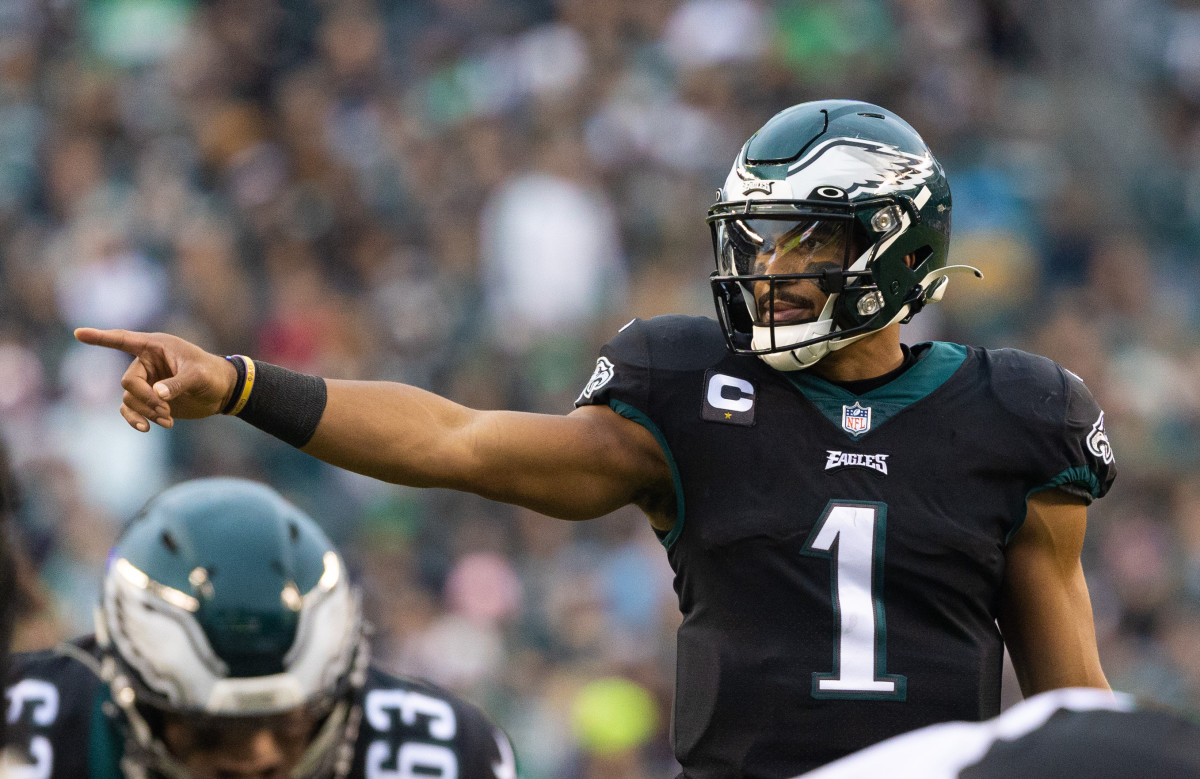Eagles Fans Can Thank the Rookie Contract System for Jalen Hurts’s Deal

As written here at the start of the month, the biggest story of the 2023 offseason was bound to be the contract structures of new deals for top quarterbacks such as Jalen Hurts, Joe Burrow and Justin Herbert (and Lamar Jackson, though it doesn’t appear he’ll get a new deal). Now a year removed from Deshaun Watson’s contract, we have yet to see what I thought would be a disruption in the industry. If that disruption was going to happen, it would be from these young faces of their franchises with high leverage. The first shoe has dropped; the Eagles secured Hurts’s signature for five extension years (thus six more seasons).
I have often said Eagles general manager Howie Roseman, who ascended to the role from a negotiating—not a scouting—background, gives the Eagles a competitive advantage. And he did so again here: He pounced on the realities of the situation and created value for the team. Roseman jumped in before the Bengals and Chargers could and set the floor to spring from.
Rookie contract system the gift that keeps on giving
Roseman strategically leveraged the last year of Hurts’s severely undervalued contract to lock him into an extension that avoids Watson’s fully guaranteed structure. In offering 2023 compensation that includes a signing bonus and salary totaling more than $30 million—to a player previously scheduled to make barely $4 million—it was almost impossible to turn down. And by adding the (perceived) highest average ever, Roseman foreclosed the Watson guarantee discussion.
Hurts will sign a “traditional contract,” with $110 million in full guarantees, all in the first half of the contract, and another $70 million or so in injury guarantees (low-value security that activates only upon injury that keeps players out for multiple seasons). The deal seems to be this: three years, $110 million and “we’ll see” about the last three years.
I haven’t seen all the numbers, but the media is drawn to the five-year, $255 million number like moths to a flame. In my time as a team executive, I was always fine with the agent framing the contract in the best light for them; it was certainly no skin off my back and usually helped close the deal. But if Hurts truly won the average-per-year PR ($51 million is a new record), I suspect the Eagles won the most important things to them, such as early money and structure.
Hurts’s two-year earnings appear to be $64 million, almost 20 million below the amount the Giants’ Daniel Jones will be receiving. As for structure, it appears all the risk is allocated to Hurts halfway through the six-year deal.

Having said this, I do understand agent Nicole Lynn taking this deal for Hurts. The situation shows the incredible power of the rookie salary scale. No player making relative peanuts in his fourth year in the NFL, as necessitated by mandatory four-year contracts for drafted players, can reasonably turn down life-changing wealth of $110 million guaranteed. The Eagles, Bengals and Chargers know this.
The best deals are the ones you don’t make
While heaping praise on Roseman, I do have to mention the luck involved. It is no secret around the league the Eagles were in on potentially acquiring Deshaun Watson, Russell Wilson and who knows who else in previous offseasons. For whatever reasons, they did not acquire them. As I always say, sometimes the best deals you make are the ones you don’t.
Also, there was no team more all-in on a player in 2020 than the Eagles with Carson Wentz. They had invested massive draft capital and a brand-new contract extension. They had allowed Nick Foles to leave in free agency to not have the extremely popular player looming over Wentz’s shoulder. And they drafted a cheap backup to balance their heavy spending on Wentz, a player named Jalen Hurts. And the rest, as they say, is history.
Watson becoming a true outlier
It is becoming more clear that the Watson contract, one that seemed like a game-changer for NFL players to put them more on par with NBA and MLB players, is becoming an outlier. Whether legally collusive, NFL owners are simply not going there, content to throw a lot of money at the top players to entice them while still preserving the nonguaranteed structure they need.
On a final note, the Hurts deal came together two days too early for me. My students at Villanova law school will be presenting their final assignment to me Wednesday and Thursday: negotiating Hurts’s contract with the Eagles. … Yes, the one that just got done in real life. They have prepared, so they can still do the presentation with analysis of the strengths and weaknesses of the deal, or they can pivot to Burrow with this as a fresh data point.
When real life gets in the way of academia …
More from Andrew Brandt this week: Dan Snyder Will Still Cash in on Devalued Commanders
